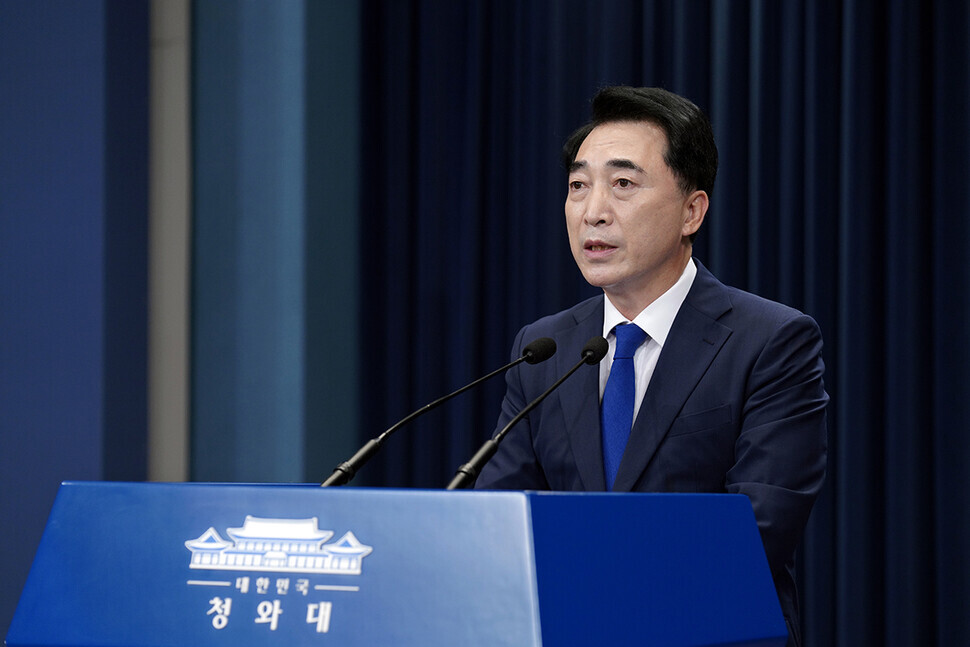hankyoreh
Links to other country sites 다른 나라 사이트 링크
[Editorial] Is Japan even interested in restoring bilateral relations with S. Korea?

Efforts to organize a South Korea-Japan summit for the Summer Olympics opening ceremony in Tokyo on Friday have failed to pan out. This dashes expectations that a bilateral summit could provide a turning point toward restoring the two sides’ ailing relationship.
The reason for this turn of events is the Japanese government’s insistence that South Korea is responsible for first presenting a “solution” on matters such as court rulings awarding compensation to survivors of forced labor mobilization. It’s deplorable to see this sort of high-pressure tactics from Japan, the party responsible for those historical abuses.
Park Soo-hyun, the Blue House senior presidential secretary for public communication, announced Monday that South Korean President Moon Jae-in had decided not to visit Japan for the Summer Olympics in Tokyo. He said that the two governments had “held meaningful discussions on making progress with historical issues between our two countries and pursuing future-oriented cooperation with an eye toward the possibility of a South Korea-Japan summit taking place during the Tokyo Olympics.”
“While we were able to reach some common understanding, this still was not enough to be regarded as summit ‘results,’” he said.
The South Korean government had consistently stressed the importance of achieving “practical results” through a summit, but the Japanese government appears not to have agreed to this.
A deep sense of distrust has piled up between Seoul and Tokyo over a number of issues, including compensation for forced labor mobilization survivors, a solution for victims of wartime sexual slavery by the Japanese military, and controls imposed by Japan on exports to South Korea.
Since it would be more or less impossible to resolve all of these complex issues all at once, the South Korean government has been calling on using relatively simple issues that the two sides can agree on as a starting point toward mending ties. It was in this context that it suggested an approach where Japan lifts its export controls while South Korea restores the two sides’ General Security of Military Information Agreement (GSOMIA).
The GSOMIA idea also ties in with demands from the Joe Biden administration in the US for stronger trilateral security cooperation by South Korea, the US and Japan. Washington has been pressing for improvements in relations between Seoul and Tokyo, with the first trilateral vice foreign minister discussions in four years to be held Wednesday.
In pushing for a South Korea-Japan summit, the government shouldered the risk of being denounced by some South Koreans as appearing “weak.” But the Japanese government showed its intent to take advantage of the situation for domestic political ends, with continued leaks to the local press about the ongoing discussions.
Additionally, Tokyo has failed to take appropriate action against Hirohisa Soma, a senior official at the Japanese embassy in South Korea who made crude remarks about Moon.
In a response on Monday morning, the Japanese government offered no official apology, saying that it would “make its decision in the interest of having the ‘right people in the right places’ in consideration of factors such as [Soma’s] tenure.” This sort of evasiveness is utterly irresponsible.
The Japanese government these days shows a lack of respect or courtesy for the other side or willingness to resolve issues through dialogue. We once again urge Japan to change its attitude.
Please direct comments or questions to [english@hani.co.kr]

Editorial・opinion
![[Editorial] Does Yoon think the Korean public is wrong? [Editorial] Does Yoon think the Korean public is wrong?](https://flexible.img.hani.co.kr/flexible/normal/500/300/imgdb/original/2024/0417/8517133419684774.jpg) [Editorial] Does Yoon think the Korean public is wrong?
[Editorial] Does Yoon think the Korean public is wrong?![[Editorial] As it bolsters its alliance with US, Japan must be accountable for past [Editorial] As it bolsters its alliance with US, Japan must be accountable for past](https://flexible.img.hani.co.kr/flexible/normal/500/300/imgdb/original/2024/0417/6817133413968321.jpg) [Editorial] As it bolsters its alliance with US, Japan must be accountable for past
[Editorial] As it bolsters its alliance with US, Japan must be accountable for past- [Guest essay] Amending the Constitution is Yoon’s key to leaving office in public’s good graces
- [Editorial] 10 years on, lessons of Sewol tragedy must never be forgotten
- [Column] A death blow to Korea’s prosecutor politics
- [Correspondent’s column] The US and the end of Japanese pacifism
- [Guest essay] How Korea turned its trainee doctors into monsters
- [Guest essay] As someone who helped forge Seoul-Moscow ties, their status today troubles me
- [Editorial] Koreans sent a loud and clear message to Yoon
- [Column] In Korea’s midterm elections, it’s time for accountability
Most viewed articles
- 1[Column] The clock is ticking for Korea’s first lady
- 2Samsung barricades office as unionized workers strike for better conditions
- 3[Editorial] When the choice is kids or career, Korea will never overcome birth rate woes
- 4[News analysis] After elections, prosecutorial reform will likely make legislative agenda
- 5S. Korea, Japan reaffirm commitment to strengthening trilateral ties with US
- 6Why Israel isn’t hitting Iran with immediate retaliation
- 7[Guest essay] How Korea turned its trainee doctors into monsters
- 8Japan officially says compensation of Korean forced laborers isn’t its responsibility
- 9[Editorial] Does Yoon think the Korean public is wrong?
- 10[Editorial] 10 years on, lessons of Sewol tragedy must never be forgotten